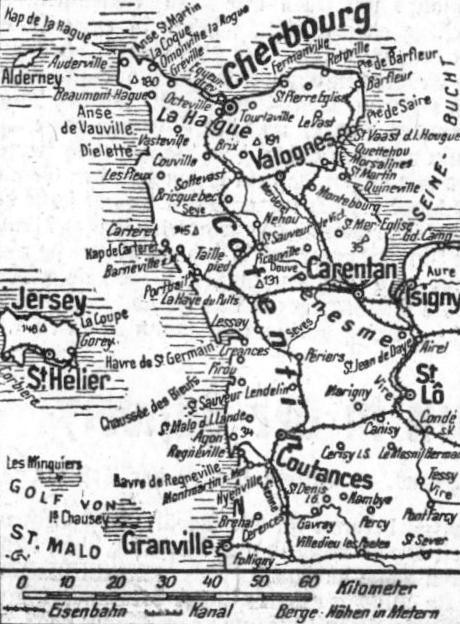Innsbrucker Nachrichten (June 16, 1944)
Südengland und das Stadtgebiet von London mit neuartigen Sprengkörpern bombardiert
Erfolgreiche Gegenangriffe in der Normandie – Weitere Bekämpfung feindlicher Ausladungen – Erbitterte Kämpfe in Mittelitalien – Wieder ein deutsches Lazarettschiff bombardiert – Sowjetische Vorstöße in hohen Norden gescheitert
Aus dem Führer-Hauptquartier, 16. Juni –
Das Oberkommando der Wehrmacht gibt bekannt:
Südengland und das Stadtgebiet von London wurden in der vergangenen Nacht und heute Vormittag mit neuartigen Sprengkörpern schwersten Kalibers belegt.
Der vergangene Tag stand in der Normandie im Zeichen erfolgreicher Gegenangriffe unserer Truppen, Panzerverbände trieben östlich der Orne einen Keil in den feindlichen Brückenkopf. Westlich Caumont sowie südöstlich und südwestlich Carentan warfen unsere Divisionen den Feind zurück und festigten ihre Stellungen. Die feindlichen Verluste waren besonders bei den Kämpfen im Raum von Carentan hoch.
Auch im Raum westlich und nördlich Sainte-Mère-Église hielten heftige Kämpfe an. Der Feind konnte dort nur geringen Geländegewinn erzielen.
Die Bekämpfung der feindlichen Ausladungen vor dem Landekopf wurde auch in der letzten Nacht durch unsere Luftwaffe erfolgreich fortgesetzt. Sie erzielte Bombentreffer in Schiffsansammlungen und Ausladungen.
Die im Kampfraum der Invasionsfront eingesetzten Bataillone der Freiwilligenverbände des Ostens haben steh bei den schweren Kämpfen voll bewährt und tapfer geschlagen.
Vorposten- und Minensuchverbände haben sich bei der Bekämpfung der Invasionsflotte in zahlreichen harten See- und Luftgefechten sowie bei der unter schwierigen Bedingungen durchgeführten Räumung feindlicher Minensperren und der Verminung feindlicher Schifffahrtswege besonders bewährt.
Bei einem Angriff britischer Bomben- und Torpedoflugzeuge auf ein deutsches Geleit vor Borkum wurden zehn feindliche Flugzeuge durch Sicherungsfahrzeuge und Bordflak zum Absturz gebracht Ein eigenes Fahrzeug ging verloren.
Vor der niederländischen Küste versenkten Vorpostenboote ein großes britisches Schnellboot und beschädigten ein weiteres schwer.
In Mittelitalien setzte der Feind seine Angriffe mit massierten Infanterie- und Panzerkräften vor allem im Raum nördlich und nordöstlich von Orvieto während des ganzen Tages fort. Die Kämpfe dauern in zwei Einbruchsstellen noch an.
Feindliche Flugzeuge griffen am 15. Juni vor der westitalienischen Küste erneut das deutsche Lazarettschiff „Erlangen“ an und warfen es in Brand.
An der Ostfront fanden auch gestern keine wesentlichen Kampfhandlungen statt.
Im hohen Norden scheiterten im Kandalakscha-Abschnitt erneut Vorstöße der Sowjets verlustreich für den Feind.
Im Finnischen Meerbusen beschädigten Sicherheitsfahrzeuge der Kriegsmarine ein erfolglos angreifendes sowjetisches Schnellboot. Wachfahrzeuge schossen über der Narwabucht fünf feindliche Flugzeuge ab.
Vor der Fischerhalbinsel griffen sowjetische Bombenflugzeuge und Schnellboote ein deutsches Geleit erfolglos an. Auch feindliche Küstenbatterien griffen in das Gefecht ein. Ein feindliches Schnellboot wurde dabei schwer beschädigt, zehn feindliche Flugzeuge wurden durch unsere Jäger vernichtet.
Ein schwächerer nordamerikanischer Bomberverband flog gestern nach Nordwestdeutschland ein und warf zerstreut Bomben im Raum von Hannover.
Angriffe einzelner britischer Flugzeuge richteten sich in der vergangenen Nacht gegen das rheinisch-westfälische Gebiet.
Deutsche Flugzeuge griffen wiederum Ziele in Südostengland an.
